
Find Help
More Items From Ergsy search
-

UK Study Links Poor Air Quality to Increased Asthma Cases in Urban Areas
Relevance: 100%
-

Rise in Childhood Asthma Linked to Air Pollution in Urban Areas
Relevance: 64%
-

What are some common pollutants that affect asthma sufferers in urban areas?
Relevance: 57%
-

Are there mobile apps to track air quality and its impact on asthma?
Relevance: 53%
-
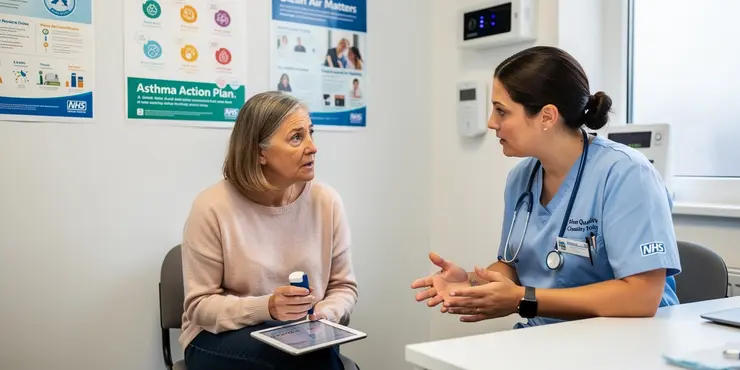
Where can I find information on air pollution and its effect on Asthma for my local area?
Relevance: 49%
-
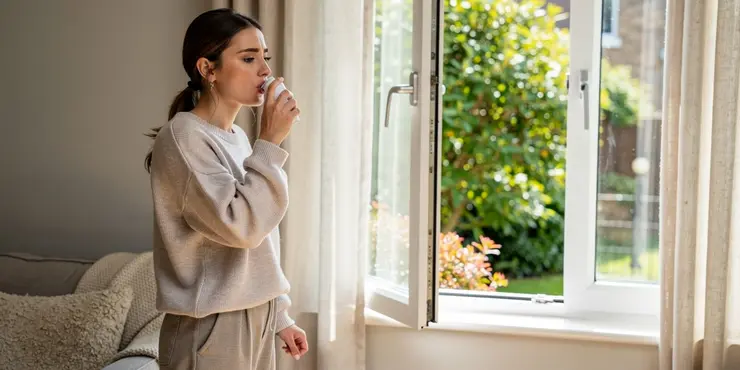
How does air pollution affect asthma?
Relevance: 46%
-
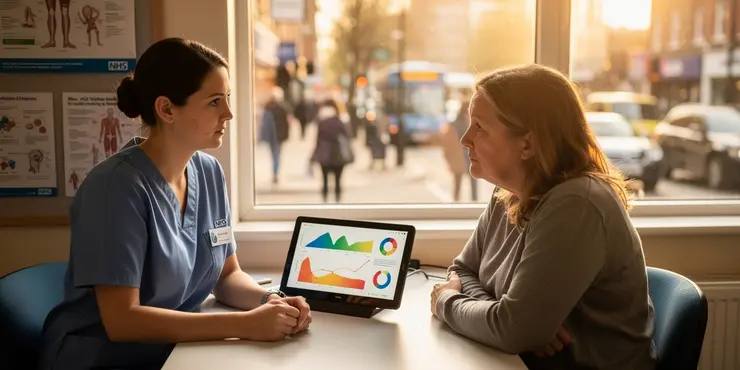
Is UK air quality changing?
Relevance: 44%
-

Where can I find research studies on air pollution and asthma in my area?
Relevance: 44%
-

Is hay fever more common in urban areas?
Relevance: 42%
-
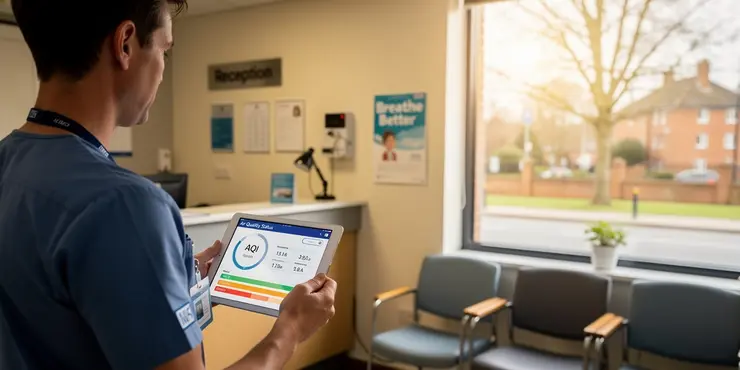
How do I check current air quality levels in my local area?
Relevance: 40%
-

High Air Pollution Levels Linked to Rising Cases of Respiratory Issues
Relevance: 36%
-

Air Pollution and Lung Cancer
Relevance: 34%
-

How can I find out if there are any air quality alerts in my area?
Relevance: 33%
-
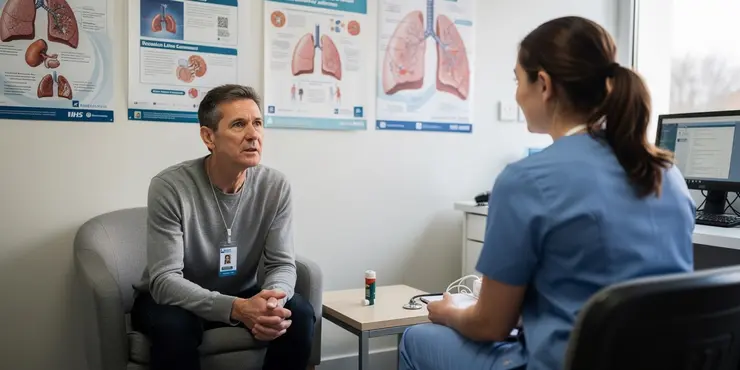
How can I reduce my exposure to air pollution if I have asthma?
Relevance: 32%
-

Why are experts warning of rising hay fever cases?
Relevance: 31%
-

Study Reveals Disparities in Welfare Support Between Urban and Rural Areas
Relevance: 31%
-

What triggers asthma attacks?
Relevance: 30%
-

What causes asthma?
Relevance: 30%
-

Is asthma a serious condition?
Relevance: 29%
-

What is Asthma?
Relevance: 29%
-
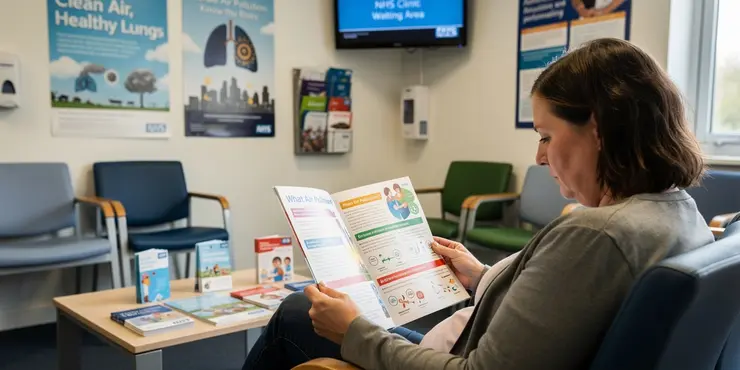
Where can I find general information about air pollution and asthma?
Relevance: 27%
-
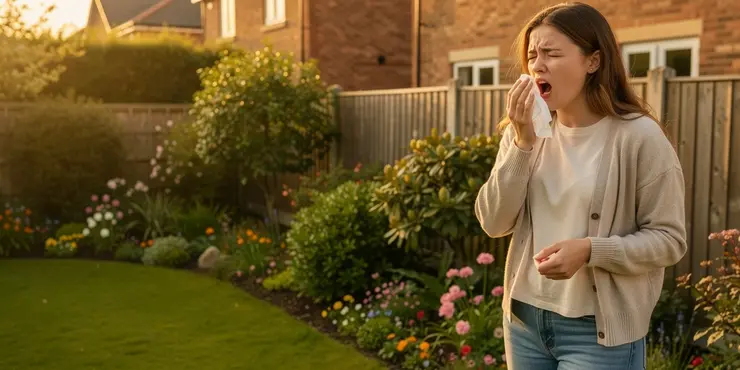
Experts Warn of Rising Hay Fever Cases as Pollen Counts Surge
Relevance: 27%
-

Are there different types of asthma?
Relevance: 27%
-

Are urban environments related to the loneliness epidemic?
Relevance: 27%
-

Can asthma be cured?
Relevance: 27%
-

An Asthma Explainer with Dr Katherine Hickman
Relevance: 27%
-

Strategies for Reducing Loneliness and Social Isolation in Urban Areas
Relevance: 27%
-

How is asthma diagnosed?
Relevance: 26%
-

How can asthma attacks be prevented?
Relevance: 26%
-

Can asthma be fatal?
Relevance: 26%
-
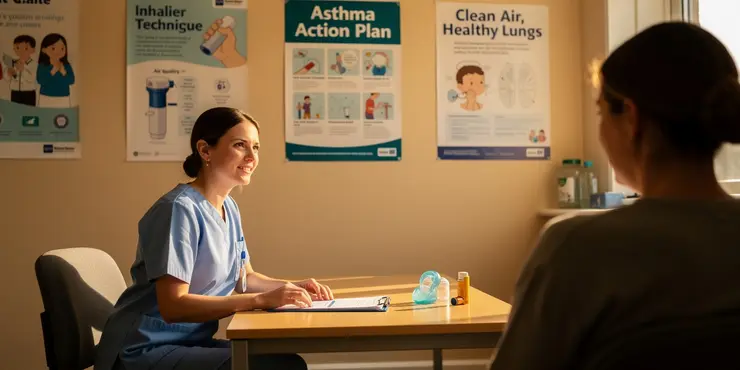
What local organizations provide information on air pollution and asthma?
Relevance: 26%
-

How is asthma treated?
Relevance: 26%
-

What local organizations provide information on air pollution and asthma?
Relevance: 25%
-
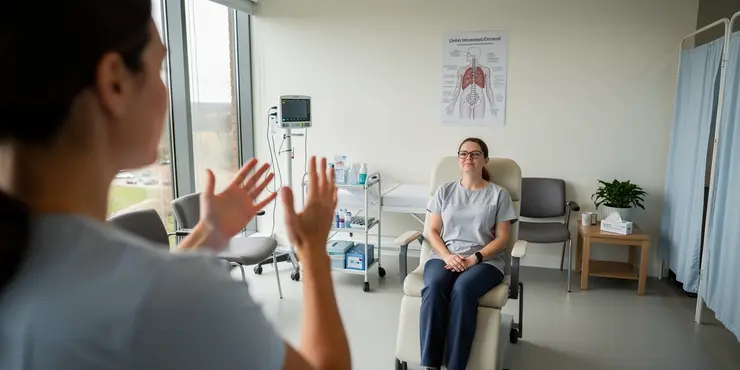
Does air physiotherapy involve medication?
Relevance: 25%
-

What are the common symptoms of asthma?
Relevance: 25%
-

What is air physiotherapy?
Relevance: 25%
-
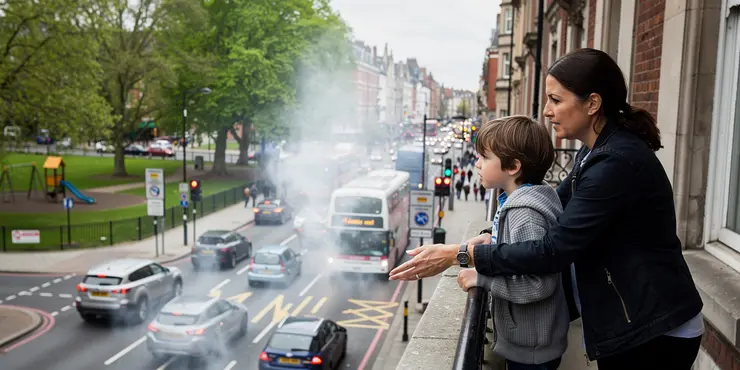
Are traffic fumes bad for my health?
Relevance: 24%
-

Who can benefit from air physiotherapy?
Relevance: 24%
-

Is a prescription needed for air physiotherapy?
Relevance: 24%
-

Are there any exercises involved in air physiotherapy?
Relevance: 24%
Introduction
A recent study conducted in the United Kingdom has established a formidable connection between poor air quality and the rising cases of asthma in urban areas. This research shines a light on an escalating public health issue, underscoring the urgent need for effective measures to combat air pollution and protect vulnerable groups, especially children, in densely populated regions.
The Study's Findings
The study, which was carried out by a team of environmental scientists and public health experts, involved collecting and analyzing data from various urban centers across the UK. The researchers found that areas with higher levels of air pollution also had higher rates of asthma cases, particularly among children and young adults. The pollutants of concern primarily include nitrogen dioxide (NO2) and particulate matter (PM2.5), both of which are prevalent in urban environments due to traffic emissions and industrial activities.
Impact on Public Health
Asthma is a chronic lung disease that affects millions of people in the UK. The condition can lead to reduced quality of life and increased healthcare costs due to its recurring nature and potential for severe attacks. The study indicates that poor air quality significantly exacerbates asthma symptoms and increases the likelihood of new cases. This not only affects individuals’ health but also places an additional burden on the NHS and society as a whole.
Vulnerable Populations
Children are particularly vulnerable to the effects of air pollution as their lungs are still developing. The study found that in areas with high air pollution, children had a notably higher incidence of asthma diagnoses compared to those in regions with cleaner air. Pregnant women and the elderly are also at risk, as exposure to pollutants can lead to a range of health issues, including respiratory and cardiovascular problems.
Government Response and Policy Implications
The findings of this study have prompted calls for more stringent air quality regulations in urban areas. Environmental groups and health organizations are urging the government to implement policies that reduce emissions from vehicles and industrial sources. There is also a push for increased investment in public transportation and green infrastructure, such as parks and green roofs, which can help improve air quality.
Community Actions and Recommendations
Communities in affected areas are encouraged to participate in initiatives aimed at reducing air pollution, such as car-sharing programs and advocacy for better cycle paths. Residents can also contribute by minimizing their own emissions through reduced use of personal vehicles and increased reliance on public transport. Furthermore, individuals with asthma cases are advised to monitor air quality reports and limit outdoor activities when pollution levels are high.
Conclusion
This UK study highlights a critical link between urban air pollution and increased asthma cases, urging immediate action from both government and citizens. Addressing air quality issues is essential not only for reducing asthma cases but also for promoting overall public health and ensuring a healthier environment for future generations.
Introduction
A new study in the UK shows that bad air makes more people get asthma in cities. This is a big health problem, and we must act fast to clean the air. This is especially important for children who live in crowded places.
The Study's Findings
Experts collected information from many UK cities. They found that places with dirty air had more asthma cases. This was mostly true for kids and young people. Bad air from cars and factories has things like nitrogen dioxide (NO2) and tiny dust (PM2.5) that make it worse.
Impact on Public Health
Asthma is a lung problem that many people in the UK have. It makes life harder and costs a lot to treat. The study shows bad air makes asthma worse and starts new cases. This hurts people's health and makes the NHS work harder.
Vulnerable Populations
Kids are affected the most because their lungs are still growing. In polluted areas, more kids get asthma compared to places with clean air. Pregnant women and older people also face health risks like breathing and heart problems from dirty air.
Government Response and Policy Implications
This study wants the government to make stricter rules for cleaner air in cities. Groups want the government to lower car and factory pollution. They also want more public transport and green spaces like parks and gardens to help clean the air.
Community Actions and Recommendations
People in polluted areas can help reduce pollution. Joining car-sharing or asking for better bike lanes can help. Use cars less and buses more. People with asthma should check air reports and stay inside when the air is bad.
Conclusion
This study shows how city air pollution and asthma are linked. We need to act quickly to fix air issues. This will help reduce asthma and improve health for everyone now and in the future.
Frequently Asked Questions
What did the UK study find about air quality and asthma?
The study found a link between poor air quality in urban areas and an increase in asthma cases.
Which areas were focused on in the study?
The study focused on urban areas in the UK.
Who conducted this study on air quality and asthma?
The study was conducted by researchers in the UK, though the specific institution was not mentioned.
What pollutants are linked to increased asthma cases?
Pollutants such as nitrogen dioxide (NO2) and particulate matter (PM2.5) are linked to increased asthma cases.
How does poor air quality affect asthma?
Poor air quality can aggravate asthma symptoms and increase the incidence of asthma attacks.
Is the increase in asthma cases significant?
Yes, the study suggests a significant increase in asthma cases correlated with poor air quality.
Did the study consider other factors besides air quality?
Yes, the study controlled for other factors, but still found a strong association between air quality and asthma.
What can be done to improve air quality in urban areas?
Improving urban air quality can involve reducing vehicle emissions, increasing green spaces, and investing in cleaner public transport systems.
Are children more affected by poor air quality?
Yes, children are particularly vulnerable to the effects of poor air quality on asthma.
Is asthma more prevalent in urban areas compared to rural?
The study suggests that asthma cases are more prevalent in urban areas with poor air quality.
How can individuals mitigate the impact of poor air quality on asthma?
Individuals can use air purifiers indoors, avoid outdoor activities on high pollution days, and follow prescribed asthma management plans.
What is the role of local governments in addressing air quality?
Local governments can enforce regulations to reduce emissions and promote policies to improve air quality.
Are there any long-term health impacts of poor air quality related to asthma?
Yes, long-term exposure to poor air quality can lead to chronic respiratory issues and decreased lung function.
What kind of data did the study on air quality use?
The study used data on air pollutant levels as well as health records related to asthma cases.
Was the study on air quality and asthma peer-reviewed?
The document does not specify, but studies of this nature often undergo peer review before publication.
Can air quality improvements reverse asthma trends?
While not specified, improving air quality could potentially reduce asthma cases over time.
What is particulate matter and why is it important?
Particulate matter (PM) consists of tiny particles in the air that can penetrate the lungs and exacerbate respiratory conditions like asthma.
Does the study mention any specific urban areas with the worst air quality?
The document does not specify which urban areas were highlighted in the study.
How has public awareness about air quality and health risks changed?
Public awareness has increased, leading to more advocacy for clean air initiatives and health protections.
What are some signs of asthma exacerbation due to poor air quality?
Signs include increased coughing, wheezing, shortness of breath, and chest tightness.
What did the UK study find about air and asthma?
A study from the UK looked at air quality and asthma.
It found that dirty air can make asthma worse. Asthma is when it's hard to breathe.
Good air is important for lungs to stay healthy.
To help with reading, you can:
- Use pictures to understand better.
- Take breaks if reading is hard.
- Ask someone to help read with you.
This study found that dirty air in cities can make more people get asthma.
What places did the study look at?
The study looked at cities and towns in the UK.
Who did this study on air and asthma?
This study was done by people who study things in the UK. We don't know the name of the place they work.
What makes asthma worse?
Some things in the air can make asthma worse. These are called pollutants. Here are some examples:
- Smoke: From cars and factories.
- Dust: Tiny bits in the air that we can't always see.
- Pollen: Comes from plants and flowers.
Helpful tools:
- Use a mask to help keep the air you breathe clean.
- Air purifiers can help clean the air in your home.
- Check the weather for air quality information.
Bad air, like nitrogen dioxide (NO2) and tiny dust (PM2.5), can make more people get asthma.
How does bad air affect asthma?
Bad air can make it hard to breathe.
People with asthma may cough or wheeze more.
Their chest might feel tight.
Stay indoors on bad air days.
Use an inhaler if you need it.
An air purifier can help keep air clean inside.
Bad air can make asthma worse. It can make asthma attacks happen more often.
Are there more people with asthma now?
The study shows more people are getting asthma because the air is dirty.
Did the study look at other things besides air quality?
Yes, the study looked at other things too, but it still showed a big link between the air we breathe and asthma.
If you find reading hard, try using a ruler or your finger to follow the words. You can also listen to the text with a text-to-speech app.
How can we make air better in cities?
Here are some ideas to help clean the air in cities:
- Use buses, trains, or bikes instead of cars.
- Plant more trees in parks and streets.
- Make factories cleaner and safer for the air.
- Use special filters on chimneys to catch dirty smoke.
- Save energy at home by turning off lights when not needed.
Try these tools to help:
- Pictures: Use pictures to show clean air ideas.
- Audio: Listen to stories about clean air.
- Videos: Watch videos that explain how to keep the air clean.
We can make city air better by doing these things:
- Have fewer cars making bad smoke.
- Plant more trees and plants.
- Use buses and trains that are better for the air.
Try using picture charts or audio stories to help understand more about these ideas.
Do bad air things hurt children more?
Yes, bad air can make asthma worse for children.
Do more people have asthma in cities than in the countryside?
Asthma is a problem that makes it hard to breathe.
Cities have lots of cars and factories. These can make the air dirty.
The countryside is usually cleaner and has more trees.
Ask a doctor if you need help with asthma.
Breathing exercises and taking medicine can help.
Use big print, pictures, or videos to learn more about asthma.
The study says that more people have asthma in cities where the air is not clean.
How can you help protect yourself from bad air if you have asthma?
If the air is bad, it can make asthma worse. Here are some simple tips:
- Check the air quality outside every day.
- Stay indoors when the air is bad.
- Use an air purifier in your home.
- Wear a mask if you need to go outside.
- Keep your asthma medicine with you.
Use reminders to help you remember these tips. Ask a friend or family member to help too.
You can use air cleaners inside your home. Stay indoors on days when the air is dirty outside. Follow the asthma plan your doctor gave you.
What do local governments do about air quality?
Local governments help keep the air clean. They: 1. Check the air to see if it's clean or dirty. 2. Make rules to stop air pollution. 3. Teach people how to keep the air clean. 4. Work with local businesses and people to reduce pollution. Tools to help understand: - Look at pictures or videos about air quality. - Use simple apps that show air pollution levels. - Ask questions to learn more about air and pollution.Local leaders can make rules to help clean the air. They can also support ideas that make the air better to breathe.
Can bad air make asthma worse over time?
Yes, breathing in bad air can make asthma worse. It can make it hard to breathe.
Here are some ways to stay healthy:
- Try to stay indoors when the air outside is bad.
- Use an air purifier at home to clean the air.
- Talk to a doctor about your asthma.
Bad air can make your lungs sick if you breathe it for a long time. It can make it hard to breathe.
What information did the study on air quality look at?
The study looked at how dirty the air was. It also looked at health records of people with asthma.
Did other experts check the study on air and asthma?
This question asks if other scientists looked at the study about air and asthma. Checking by other experts helps us know if the study is good.
Tools to help:
- Dictionary: Use a dictionary to understand hard words.
- Ask for help: You can ask a teacher or a friend to explain it.
- Audio tools: Listen to the question if that's easier.
The paper does not say this. But usually, studies like this are checked by other experts before they are shared with everyone.
Can cleaner air help asthma get better?
Better air quality might help people with asthma feel better over time.
What is particulate matter and why does it matter?
Particulate matter, or PM, is tiny bits of dust and dirt in the air.
It's important because it can affect our health. Breathing in too much PM can make it hard to breathe or make us sick.
Tools like air filters can help clean the air. Also, check the weather app for air quality warnings to know when the air is not safe.
Particulate matter (PM) is tiny pieces of dirt and dust in the air. These tiny pieces can get into your lungs and make breathing problems, like asthma, worse.
Supportive tools: Try using simple air quality apps to check pollution levels. Stay inside when the air quality is bad.
Does the study talk about city places with very bad air?
If reading is hard, try these tips:
- Use a ruler or finger to guide your reading.
- Read out loud slowly.
- Ask someone to read with you.
- Look for pictures or videos about the topic.
The paper doesn't say which cities were talked about in the study.
How do people now know more about air quality and health risks?
Things have changed. More people know about the air we breathe and how it can affect our health. This means they can make better choices to stay healthy.
Here are some tips to understand more:
- Look at news or TV programs that talk about clean air.
- Use apps or websites that show air quality in your area.
- Ask a teacher or a friend if you have questions.
More people know about clean air now. They speak up to make the air clean and keep us healthy.
What are the signs that asthma is getting worse because of bad air?
Signs include more coughing, noisy breathing, not enough breath, and tight feeling in the chest.
Useful Links
This website offers general information and is not a substitute for professional advice.
Always seek guidance from qualified professionals.
If you have any medical concerns or need urgent help, contact a healthcare professional or emergency services immediately.
Some of this content was generated with AI assistance. We’ve done our best to keep it accurate, helpful, and human-friendly.
- Ergsy carfully checks the information in the videos we provide here.
- Videos shown by Youtube after a video has completed, have NOT been reviewed by ERGSY.
- To view, click the arrow in centre of video.
- Most of the videos you find here will have subtitles and/or closed captions available.
- You may need to turn these on, and choose your preferred language.
- Go to the video you'd like to watch.
- If closed captions (CC) are available, settings will be visible on the bottom right of the video player.
- To turn on Captions, click settings .
- To turn off Captions, click settings again.
More Items From Ergsy search
-

UK Study Links Poor Air Quality to Increased Asthma Cases in Urban Areas
Relevance: 100%
-

Rise in Childhood Asthma Linked to Air Pollution in Urban Areas
Relevance: 64%
-

What are some common pollutants that affect asthma sufferers in urban areas?
Relevance: 57%
-

Are there mobile apps to track air quality and its impact on asthma?
Relevance: 53%
-

Where can I find information on air pollution and its effect on Asthma for my local area?
Relevance: 49%
-

How does air pollution affect asthma?
Relevance: 46%
-

Is UK air quality changing?
Relevance: 44%
-

Where can I find research studies on air pollution and asthma in my area?
Relevance: 44%
-

Is hay fever more common in urban areas?
Relevance: 42%
-

How do I check current air quality levels in my local area?
Relevance: 40%
-

High Air Pollution Levels Linked to Rising Cases of Respiratory Issues
Relevance: 36%
-

Air Pollution and Lung Cancer
Relevance: 34%
-

How can I find out if there are any air quality alerts in my area?
Relevance: 33%
-

How can I reduce my exposure to air pollution if I have asthma?
Relevance: 32%
-

Why are experts warning of rising hay fever cases?
Relevance: 31%
-

Study Reveals Disparities in Welfare Support Between Urban and Rural Areas
Relevance: 31%
-

What triggers asthma attacks?
Relevance: 30%
-

What causes asthma?
Relevance: 30%
-

Is asthma a serious condition?
Relevance: 29%
-

What is Asthma?
Relevance: 29%
-

Where can I find general information about air pollution and asthma?
Relevance: 27%
-

Experts Warn of Rising Hay Fever Cases as Pollen Counts Surge
Relevance: 27%
-

Are there different types of asthma?
Relevance: 27%
-

Are urban environments related to the loneliness epidemic?
Relevance: 27%
-

Can asthma be cured?
Relevance: 27%
-

An Asthma Explainer with Dr Katherine Hickman
Relevance: 27%
-

Strategies for Reducing Loneliness and Social Isolation in Urban Areas
Relevance: 27%
-

How is asthma diagnosed?
Relevance: 26%
-

How can asthma attacks be prevented?
Relevance: 26%
-

Can asthma be fatal?
Relevance: 26%
-

What local organizations provide information on air pollution and asthma?
Relevance: 26%
-

How is asthma treated?
Relevance: 26%
-

What local organizations provide information on air pollution and asthma?
Relevance: 25%
-

Does air physiotherapy involve medication?
Relevance: 25%
-

What are the common symptoms of asthma?
Relevance: 25%
-

What is air physiotherapy?
Relevance: 25%
-

Are traffic fumes bad for my health?
Relevance: 24%
-

Who can benefit from air physiotherapy?
Relevance: 24%
-

Is a prescription needed for air physiotherapy?
Relevance: 24%
-

Are there any exercises involved in air physiotherapy?
Relevance: 24%


